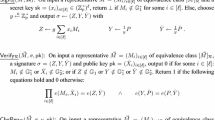Abstract
The notion of pseudo-freeness of a group was introduced by Hohenberger, and formalized by Rivest in order to unify cryptographic assumptions. Catalano, Fiore and Warinschi proposed the adaptive pseudo-free group as a generalization of pseudo-free group. They showed that the RSA group \(\mathbb{Z}_N^\times\) is pseudo-free even if the adversary against pseudo-freeness is allowed to operate adaptively, provided that the adaptive behavior of the adversary is restricted by some specific parametric distribution. They also proposed the notion of strong adaptive pseudo-freeness in which the adaptive behavior of the adversary is not restricted. However, it remains open whether \(\mathbb{Z}_N^\times\) is also strongly-adaptive pseudo-free under the strong RSA (SRSA) assumption.
In this paper, we give a negative circumstantial evidence for the question. We show that the SRSA assumption does not imply the strong adaptive pseudo-freeness of \(\mathbb{Z}_N^\times\), as far as the algebraic reduction is concerned. The algebraic reduction means that the algorithm of the black-box reduction performs only group operations for elements in \(\mathbb{Z}_N^\times\). Our result indicates that the strong adaptive pseudo-freeness for the RSA group \(\mathbb{Z}_N^\times\) cannot be shown under the SRSA assumption, by employing only current proof techniques which are used in ordinary security proofs.
Access this chapter
Tax calculation will be finalised at checkout
Purchases are for personal use only
Preview
Unable to display preview. Download preview PDF.
Similar content being viewed by others
References
Abe, M., Groth, J., Ohkubo, M.: Separating Short Structure-Preserving Signatures from Non-interactive Assumptions. In: Lee, D.H., Wang, X. (eds.) ASIACRYPT 2011. LNCS, vol. 7073, pp. 628–646. Springer, Heidelberg (2011)
Abe, M., Haralambiev, K., Ohkubo, M.: Group to Group Commitments Do Not Shrink. In: Pointcheval, D., Johansson, T. (eds.) EUROCRYPT 2012. LNCS, vol. 7237, pp. 301–317. Springer, Heidelberg (2012)
Agrawal, M., Kayal, N., Saxena, N.: PRIMES Is in P. Annals of Mathematics 160(2), 781–793 (2004)
Anokhin, M.: Constructing a Pseudo-Free Family of Finite Computational Groups under the General Integer Factoring Intractability Assumption. Electronic Colloquium on Computational Complexity. report no.114 (2012)
Barić, N., Pfitzmann, B.: Collision-Free Accumulators and Fail-Stop Signature Schemes Without Trees. In: Fumy, W. (ed.) EUROCRYPT 1997. LNCS, vol. 1233, pp. 480–494. Springer, Heidelberg (1997)
Bellare, M., Namprempre, C., Pointcheval, D., Semanko, M.: The Power of RSA Inversion Oracles and the Security of Chaum’s RSA-Based Blind Signature Scheme. In: Syverson, P. (ed.) FC 2001. LNCS, vol. 2339, pp. 319–338. Springer, Heidelberg (2002)
Bellare, M., Namprempre, C., Pointcheval, D., Semanko, M.: The One-More-RSA-Inversion Problems and the Security of Chaum’s Blind Signature Scheme. J. Cryptology 16(3), 185–215 (2008)
Boneh, D.: The Decision Diffie-Hellman Problem. In: Buhler, J.P. (ed.) ANTS 1998. LNCS, vol. 1423, pp. 48–63. Springer, Heidelberg (1998)
Bresson, E., Monnerat, J., Vergnaud, D.: Separation Results on the “One-More” Computational Problems. In: Malkin, T. (ed.) CT-RSA 2008. LNCS, vol. 4964, pp. 71–87. Springer, Heidelberg (2008)
Catalano, D., Fiore, D., Warinschi, B.: Adaptive Pseudo-free Groups and Applications. In: Paterson, K.G. (ed.) EUROCRYPT 2011. LNCS, vol. 6632, pp. 207–223. Springer, Heidelberg (2011)
Cramer, R., Shoup, V.: Signature Schemes Based on the Strong RSA Assumption. J. ACM TISSEC 3(3), 161–185 (2000)
Diffie, W., Hellman, M.: New Directions in Cryptography. IEEE Trans. on Information Theory 22(6), 644–654 (1976)
Fujisaki, E., Okamoto, T.: Statistical Zero Knowledge Protocols to Prove Modular Polynomial Relations. In: Kaliski Jr., B.S. (ed.) CRYPTO 1997. LNCS, vol. 1294, pp. 16–30. Springer, Heidelberg (1997)
Garg, S., Bhaskar, R., Lokam, S.V.: Improved Bounds on Security Reductions for Discrete Log Based Signatures. In: Wagner, D. (ed.) CRYPTO 2008. LNCS, vol. 5157, pp. 93–107. Springer, Heidelberg (2008)
Hasegawa, S., Isobe, S., Shizuya, H., Tashiro, K.: On the Pseudo-Freeness and the CDH Assumption. International Journal of Information Security 8(5), 347–355 (2009)
Hirano, T., Tanaka, K.: Variations on Pseudo-Free Groups. Research Reports, Series C: Computer Science, C-239, Tokyo Institute of Technology (2007)
Hohenberger, S.: The Cryptographic Impact of Groups with Infeasible Inversion. Master’s thesis, EECS Dept., MIT (2003)
Jhanwar, M.P., Barua, R.: Sampling from Signed Quadratic Residues: RSA Group Is Pseudofree. In: Roy, B., Sendrier, N. (eds.) INDOCRYPT 2009. LNCS, vol. 5922, pp. 233–247. Springer, Heidelberg (2009)
Micciancio, D.: The RSA Group is Pseudo-Free. In: Cramer, R. (ed.) EUROCRYPT 2005. LNCS, vol. 3494, pp. 387–403. Springer, Heidelberg (2005)
Micciancio, D.: The RSA Group is Pseudo-Free. J. Cryptology 23(2), 169–186 (2010)
Paillier, P., Vergnaud, D.: Discrete-Log-Based Signatures May Not Be Equivalent to Discrete Log. In: Roy, B. (ed.) ASIACRYPT 2005. LNCS, vol. 3788, pp. 1–20. Springer, Heidelberg (2005)
Pointcheval, D., Stern, J.: Security Arguments for Digital Signatures and Blind Signatures. J. Cryptology. 13(3), 361–396 (2000)
Rivest, R.L., Shamir, A., Adleman, L.M.: A Method for Obtaining Digital Signatures and Public-Key Cryptosystems. Communications of the ACM 21(2), 120–126 (1978)
Rivest, R.L.: On the Notion of Pseudo-Free Groups. In: Naor, M. (ed.) TCC 2004. LNCS, vol. 2951, pp. 505–521. Springer, Heidelberg (2004)
Schnorr, C.P.: Efficient Identification and Signatures for Smart Cards. In: Quisquater, J.-J., Vandewalle, J. (eds.) EUROCRYPT 1989. LNCS, vol. 434, pp. 688–689. Springer, Heidelberg (1990)
Seurin, Y.: On the Exact Security of Schnorr-Type Signatures in the Random Oracle Model. In: Pointcheval, D., Johansson, T. (eds.) EUROCRYPT 2012. LNCS, vol. 7237, pp. 554–571. Springer, Heidelberg (2012)
Villar, J.L.: Optimal Reductions of Some Decisional Problems to the Rank Problem. In: Wang, X., Sako, K. (eds.) ASIACRYPT 2012. LNCS, vol. 7658, pp. 80–97. Springer, Heidelberg (2012)
Author information
Authors and Affiliations
Editor information
Editors and Affiliations
Rights and permissions
Copyright information
© 2013 Springer-Verlag Berlin Heidelberg
About this paper
Cite this paper
Fukumitsu, M., Hasegawa, S., Isobe, S., Koizumi, E., Shizuya, H. (2013). Toward Separating the Strong Adaptive Pseudo-freeness from the Strong RSA Assumption. In: Boyd, C., Simpson, L. (eds) Information Security and Privacy. ACISP 2013. Lecture Notes in Computer Science, vol 7959. Springer, Berlin, Heidelberg. https://doi.org/10.1007/978-3-642-39059-3_6
Download citation
DOI: https://doi.org/10.1007/978-3-642-39059-3_6
Publisher Name: Springer, Berlin, Heidelberg
Print ISBN: 978-3-642-39058-6
Online ISBN: 978-3-642-39059-3
eBook Packages: Computer ScienceComputer Science (R0)




